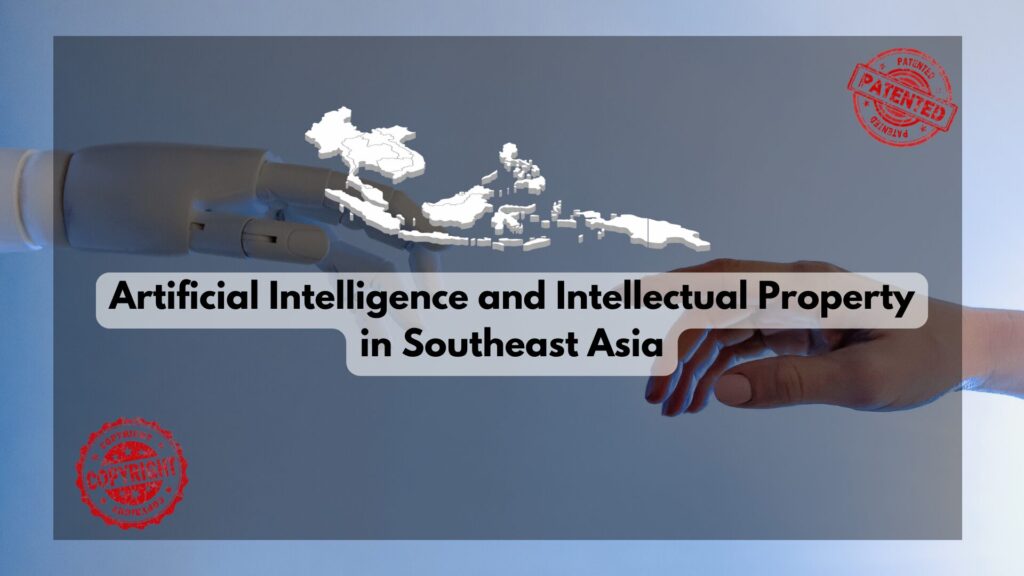
Artificial Intelligence and Intellectual Property Ownership in ASEAN Countries
The rise of Artificial Intelligence (AI) is reshaping industries across the globe, and the fields of intellectual property (IP) law and policy in ASEAN countries, including Singapore, Malaysia, Thailand, the Philippines, Indonesia, and Vietnam, are no exceptions. These nations, as innovation-driven economies, are actively navigating the complex interplay between AI advancements and existing IP frameworks, particularly concerning the ownership of AI-generated works.
AI as a Catalyst for Innovation
AI has emerged as a transformative force, revolutionizing fields ranging from healthcare to finance and manufacturing. Across ASEAN, governments and industries are leveraging AI to drive innovation, enhance productivity, and create competitive advantages in the global market. However, the rapid development of AI technologies brings significant challenges to the traditional notions of IP ownership. Specifically, questions arise about how to attribute authorship and ownership for works and inventions generated by AI systems.
Intellectual Property Ownership of AI-Generated Works
Traditionally, IP laws are designed to protect creations of the human mind, such as inventions, literary and artistic works, designs, and trademarks. However, AI systems’ ability to autonomously generate content—whether it’s music, art, code, or inventions—poses a critical challenge. Each ASEAN country has adopted different approaches and is grappling with the complexities of this issue:
Singapore’s Approach
Singapore, as a hub for technology and innovation, has been proactive in addressing IP challenges:
- Copyrights: The amended Copyright Act 2021 provides clarity for human creators but does not specifically address AI-generated works, leaving the issue open for further discussion.
- Patents: The patent framework requires human inventorship, excluding AI-generated inventions from protection unless attributed to a human collaborator.
- Opportunities: Singapore’s focus on fostering innovation includes exploring ways to accommodate AI within its IP framework, making it a leader in regional discussions.
Malaysia’s Position
In Malaysia, the Intellectual Property Corporation of Malaysia (MyIPO) governs the IP framework. Currently:
- Copyrights: The Copyright Act 1987 grants protection to works created by human authors. AI-generated works are not explicitly covered, raising uncertainties about their eligibility for protection.
- Patents: The Patents Act 1983 mandates that an inventor must be a natural person, excluding AI systems from being recognized as inventors.
- Challenges: Without legislative reforms, the ownership of AI-generated works remains ambiguous, requiring creators to seek guidance from IP professionals.
Thailand’s Developments
Thailand is gradually adapting its IP laws to address AI advancements:
- Copyrights: The Copyright Act B.E. 2537 (1994) protects works by human creators but lacks provisions for AI-generated content.
- Patents: Inventorship under the Department of Intellectual Property (DIP) is limited to natural persons, excluding AI systems.
- Challenges: The absence of clear guidelines for AI-generated works creates uncertainties for innovators relying on AI technologies.
The Philippines’ Perspective
The Philippines is fostering innovation through AI but faces similar challenges in its IP regime:
- Copyrights: The Intellectual Property Code (Republic Act No. 8293) protects works created by human authors, leaving AI-generated works unaddressed.
- Patents: The Intellectual Property Office of the Philippines (IPOPHL) requires human inventorship, creating barriers for recognizing AI-driven inventions.
- Outlook: Legislative reforms are needed to provide clarity on the ownership of AI-generated IP.
Indonesia’s Approach
Indonesia, as a growing tech hub, is advancing its IP laws but still lacks provisions for AI-generated works:
- Copyrights: The Copyright Act No. 28 of 2014 protects original works by humans, leaving AI-generated content in a legal gray area.
- Patents: The Directorate General of Intellectual Property (DGIP) mandates that inventors must be human, excluding AI systems.
- Future Directions: Clear policies are essential to address ownership and authorship issues for AI-generated creations.
Vietnam’s Landscape
Vietnam is evolving its IP framework to align with its ambitions as an innovation-driven economy:
- Copyrights: The Law on Intellectual Property 2005, amended in 2022, protects human-generated works but does not explicitly address AI-generated content.
- Patents: The National Office of Intellectual Property (NOIP) requires human inventorship, excluding AI-generated inventions from protection.
- Challenges: Vietnam’s IP laws must be updated to reflect the realities of AI-generated works and their ownership.
Cross-Border Challenges and Opportunities
AI-driven IP ownership issues transcend national borders. For businesses and creators across ASEAN, these challenges underscore the need for collaborative efforts, including:
- Developing a unified regional framework to address AI-generated IP.
- Sharing best practices for determining authorship and ownership.
- Building capacity among IP professionals to navigate the complexities of AI-driven innovations.
Future Directions
To remain competitive in the AI era, ASEAN countries must:
- Modernize Legislation: Update IP laws to explicitly address the ownership of AI-generated works.
- Seek Expert Guidance: Encourage collaboration between innovators and IP professionals to ensure appropriate protection.
- Foster Regional Cooperation: Develop harmonized approaches to AI-related IP challenges across ASEAN.
Conclusion
The issue of IP ownership for AI-generated works presents both challenges and opportunities for ASEAN countries. By modernizing legislation and fostering regional collaboration, ASEAN can establish a robust framework to address these complexities and support the growth of AI-driven innovation. Protecting intellectual property remains the cornerstone of sustainable innovation in the AI era.
Should you wish to learn more, contact Pintas IP today. Our team of experts are ready to assist you in securing your creative and technological advancements for sustained success.
